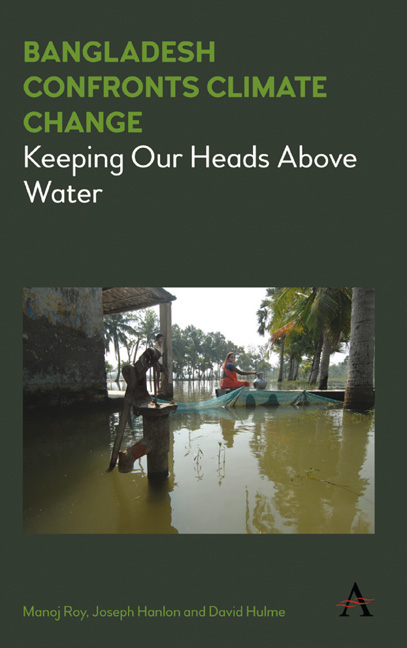Book contents
- Frontmatter
- Content
- List of Illustrations
- Abbreviations, Acronyms and Bangladeshi Terms
- Acknowledgements
- About the Authors
- Chapter One Actors, Not Victims
- Chapter Two How Will Climate Change Hit Bangladesh?
- Chapter Three Taking the Lead in Negotiations – and Moving Forward
- Chapter Four Sea Level Rise and the Vulnerable Coast – Where Farmers Know More than Engineers
- Chapter Five Saving Lives with Cyclone Shelters
- Chapter Six Living with Floods
- Chapter Seven Agronomists Keeping Ahead of Climate Change
- Chapter Eight No Climate Change Migrants – Yet
- Chapter Nine How Can the Privatized Megacity Cope with Climate Change?
- Chapter Ten Is Climate Change Only a Problem for the Urban Poor?
- Chapter Eleven Power – Political, Financial and Electrical
- Chapter Twelve Bangladesh on the Front Line of Climate Change
- Index
Chapter Nine - How Can the Privatized Megacity Cope with Climate Change?
Published online by Cambridge University Press: 22 July 2017
- Frontmatter
- Content
- List of Illustrations
- Abbreviations, Acronyms and Bangladeshi Terms
- Acknowledgements
- About the Authors
- Chapter One Actors, Not Victims
- Chapter Two How Will Climate Change Hit Bangladesh?
- Chapter Three Taking the Lead in Negotiations – and Moving Forward
- Chapter Four Sea Level Rise and the Vulnerable Coast – Where Farmers Know More than Engineers
- Chapter Five Saving Lives with Cyclone Shelters
- Chapter Six Living with Floods
- Chapter Seven Agronomists Keeping Ahead of Climate Change
- Chapter Eight No Climate Change Migrants – Yet
- Chapter Nine How Can the Privatized Megacity Cope with Climate Change?
- Chapter Ten Is Climate Change Only a Problem for the Urban Poor?
- Chapter Eleven Power – Political, Financial and Electrical
- Chapter Twelve Bangladesh on the Front Line of Climate Change
- Index
Summary
It took only an hour and a half to go the 7 km from the hotel to Dhaka University – normal in Dhaka. But it rained during our interview. Not an unusual rain – a normal Dhaka shower. But when we left, many roads were flooded and the city was grid-locked. Most traffic is private cars, but there are many cycle rickshaws and three-wheel taxis called CNGs (after their fuel – compressed natural gas) as well as a few buses and lorries.
Legally or illegally, formally or informally, almost all spaces in this city are private. Even public space is informally privatized. We may be caught in a traffic jam but we each have our own private bit of road space, according to class. The poor sit in their rickshaws, a few mini buses and buses carry those going longer distances, office workers are in the CNGs, some ride motorcycles and the better off are in their cars. Caught in the traffic, people still work. Those in cars with drivers are on their mobile telephones; the woman in the CNG next to us is editing a report. But we are caught in a jam. At one point there were four ambulances with sirens screaming caught in the jam with us. Rich and poor, well and sick all move at the same speed.
Dhaka is the 11th largest city in the world and the densest megacity (see Box 9.1) but it is largely without mass transport. The national bus company has only 263 buses running city services in Dhaka; after more than a decade of discussions, work on a first Japanese-aid-funded metro line began in 2016, as did work on a bus rapid transit line. A 2012 survey at ten major road junctions found 61 per cent of vehicles were motorized personal transport, serving only the best off 7 per cent of the city's population. Yet in the first decade of the twenty-first century, the government of Bangladesh concentrated on constructing $100 mn worth of flyovers in Dhaka, hoping to improve the movement of private cars.
- Type
- Chapter
- Information
- Bangladesh Confronts Climate ChangeKeeping Our Heads above Water, pp. 111 - 128Publisher: Anthem PressPrint publication year: 2016



